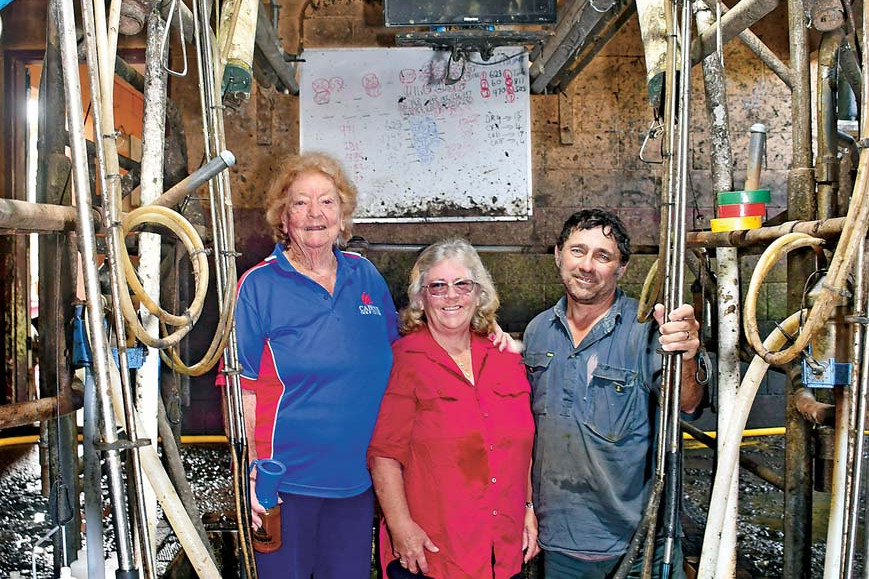On The Land
11 September, 2024
Clocking off on ‘chasing the watch’
ON a quiet early morning in the Malanda countryside, a quietly significant moment occurred at the Sartor dairy farm along Glen Allyn Road.

Helen Lodding carried out a final herd recording at the farm, while her mother, Dawn Gaul, kept a watchful eye, as farm owner Eddie Sartor brought his cows in for milking.
The moment signified the end of an era. The Sartor dairy business would be closing after 66 years.
For Eddie, now 60, it was time to “stop chasing the watch”. For Dawn, now 91, it was the end of a herd recording career of 45 years, during which time she carried out 540 of the once-a-month tests.
Her daughter Helen has been conducting the recordings at the farm since Dawn retired three years ago. All up, the cows have been monitored each month for 48 years, or 576 times.
The dairy farm was bought by the Sartors in 1968, and son Eddie took it over with his wife in 2000.
Eddie said the herd tests began in 1976 and were vital in monitoring the health of the cows, and the quality and quantity of the milk.
They were encouraged by the Department of Primary Industry at the time, which once had an office in Malanda, four full-time officers and even a government vet, Eddie said.
“But the government pulled all of them, we’ve got nothing now,” he added.
But testing was maintained, the importance of which could not be stressed, according to Eddie.
The process involves attaching meters to the milking lines, and a certain amount of milk is dripped into a small flask for calibration, he explained. Each flask is carefully identified and dated.
“Basically, the sample provides the base recording which can be calculated to keep a running total of how many litres your cow gives you a month,” Eddie said, providing the math that a cow recording nine litres in the morning and seven in the afternoon gives you 16 litres which multiplied by 30 provides the total.
“They also take a sample bottle which gets sent to laboratories and analyzed for fat, protein and cell count, the whole show,” he said.
“The information gives you which cows are the better to breed from, who gives the best litres, the fat components and protein components.”
Cell count was also important in identifying the number of white blood cells at work in the cow. The more cells, the more infection is being fought. This can warn against mastitis, milk quality, infection treatment or any underlying problem with the animal, which can lead to culling and selling.
Eddie said about 75% of dairy farms used to herd test but that number had dropped.
“It’s a long-established practice, but in fact it has probably gone out of favour in recent years because of costs,” he said.
“The dairy industry was deregulated in 2000, and basically it’s been a struggle ever since. If you remember that $1 milk at the supermarkets, it sent many farmers to the wall basically, or they were working for next to nothing.”
Eddie said there were 200 farms in the area in 2000 and now they numbered about 35.
“That’s what deregulation did to this area,” he said.
“Every second farm up here was about dairy. I can remember in the 80s there were about 350 farms.”
The irony now is that FNQ milk is in tight supply, with milk trucked up twice a week to meet demand when production is down.
“In that 90 days and 90 nights of rain we had here, we were really short,” he said. “We were down to 50 per cent of production, it hit the animals so hard.”
Eddie said he is looking forward to a life without milking hours. The property won’t be sold, they’ll keep the land and agist to fellow dairy farmers.
“Dairy farming is a massive commitment, you basically work off that watch, morning and afternoon. You can’t go off and say ‘oh, geez, I don’t feel like it’, whether you’re sick or hungover or whatever,” he said with a laugh.
Even simple family tasks like taking the kids to sports training afternoons were timed so the milking wasn’t missed.
“I’m closing down basically because I’m 60 and I’ve got two kids who went to university and work in Brisbane so they’re not interested in coming back on the farm,” Eddie said.
“I’ll probably have a rest for starters, then I’ll have time to maintain the farm, the fences, the weed spraying.”
Then comes bigger adventures, where the watch is their friend.
“We’ll have time on our hands to get away a bit more,” he mused.
“We’re looking forward to less rushed travelling, possibly buying a caravan, and doing a big trip to places we’ve never been able to visit like South Australia and Western Australia. It will be at a relaxed pace.”


